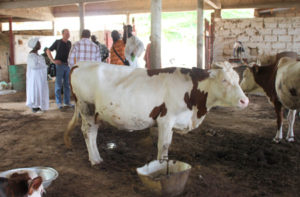Milk is an important part of infants’ and growing children’s nutrition. In fact milk has been identified as one of the most important routes to improve child health and nutrition in Sub-Saharan Africa. Despite the large cattle population the West African countries are not importers of milk and other dairy products. There is an urgent need to improve the situation.
The benefits of enhancing market-oriented dairy production go additionally beyond the health and nutrition aspects as production creates daily income to farmers and also supports other actors along the production and consumption chain by creating employment.
Efficient and sustainable dairy production requires cattle breed-types that are not only productive but also well adapted to the local production conditions and meet farmers’ requirements. For this reason Food Africa Programme’s work package 2 concentrates on identifying and promoting appropriate breed-types for small to medium scale dairy producers in Senegal.
Farmers need more knowledge for dairy production
A large number of different breed-types of dairy animals are currently being utilized in peri-urban dairy production systems in Senegal, including indigenous breeds like the West African Zebu, exotic breeds such as the European dairy breeds, and crosses between these.
Despite this, farmers lack information on the relative performance of these different breed-types, particularly from a socio-economic viewpoint. In addition, farmers generally have little information on how their own animals perform.
To respond to these needs, Work Package 2 will utilize up-to-date methodology to identify and analyze the relative socio-economic performance of various breed combinations currently kept by small to medium scale dairy farmers in peri-urban system. The results of this work will be disseminated to various stakeholders in dairy production, including dairy farmers and processers, as well as policy makers.
Further, Work Package 2 will work towards strengthened mechanisms for affordable and equitable access to the breeds that the dairy farmers demand.

Enhanced capacity in dairy production and research
A further objective of Work Package 2 is to enhance the capacity of stake-holders involved in dairy production, including dairy farmers, companies involved in supplying breeding materials, and policy makers amongst others. This will be achieved by a number of targeted workshops and training events.
In addition, the research capacity of scientists from Senegal will be enhanced, through partnering with the University of Bamako and through supporting a locally recruited PhD student.
Objectives for WP2
Work Package 2 has the following objectives:
- Determine the most appropriate dairy breed/cross-breed types for peri-urban dairy production systems in Senegal, and disseminate this information
- Characterize the dairy germ plasma production chain, and related policies, and use this information to develop a strategy for strengthened dairy germ plasma production and delivery systems
- Enhance local human, institutional and organizational capacity on accessing and promoting different breeds/cross-breeds of livestock
